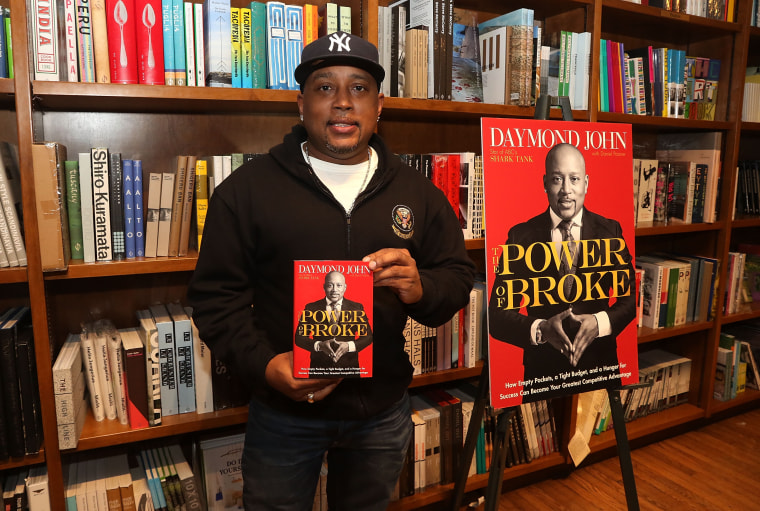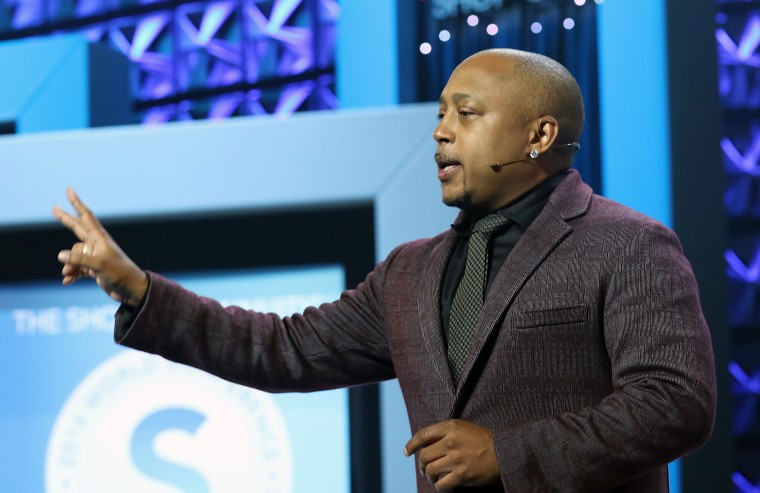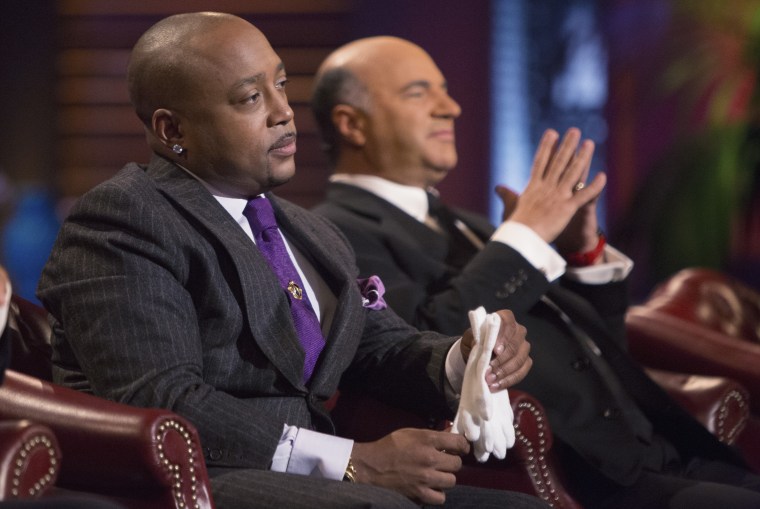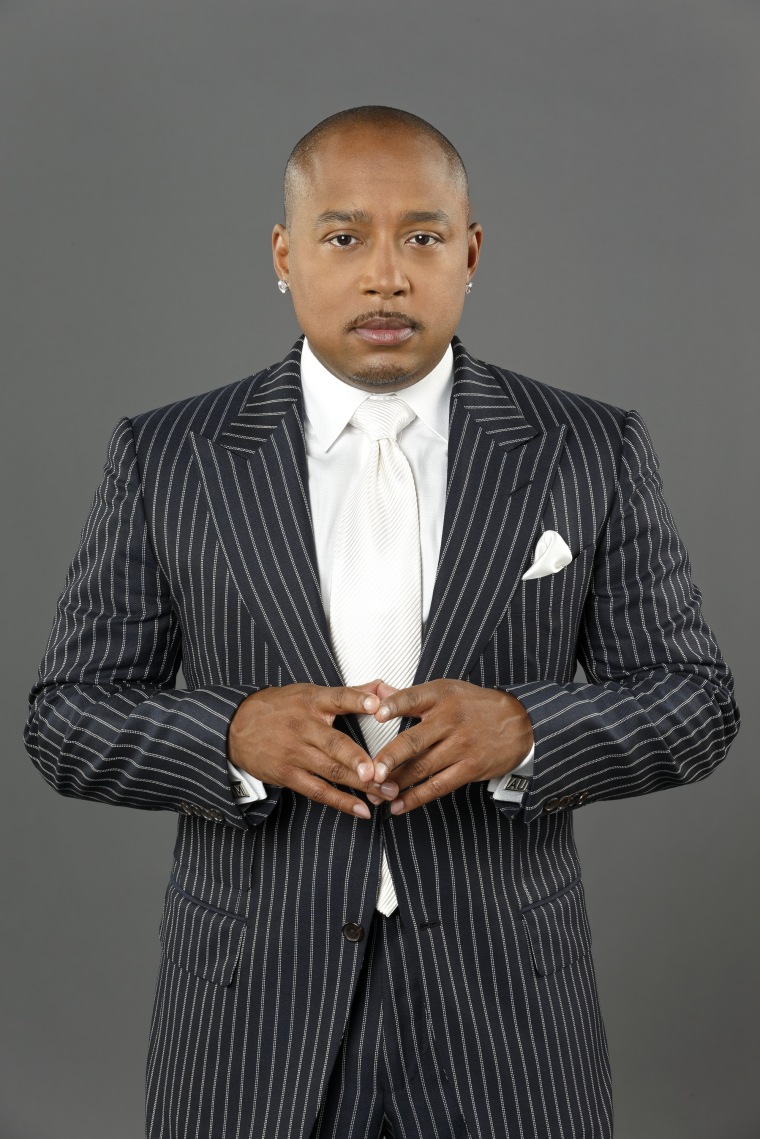
Some may recognize Daymond John as the brilliant, quick-witted, yet rational judge on ABC’s series Shark Tank. Others may know him as the Queens Native who turned hip hop clothing line FUBU (For Us By Us) into a $6 billion dollar company.
Regardless of the capacity, Daymond reigns as an entrepreneur extraordinaire in every sense of the term and The Power of Broke, Daymond’s third book (written with Daniel Paisner), highlights personal stories on his journey to financial freedom as a business owner.
This isn’t your typical self-help book that lightly treads on the basic dos and don’ts for budding entrepreneurs. Immediately, Daymond lets you know that no matter how often you find yourself on the brink of failing, success is your only option.
The branding and marketing consultant dishes on everything from recognizing opportunity and avoiding out- burning resources to keeping a tight budget and discovering the secret of other’s people magic.
He also provides ‘Power Facts’: 70 percent of small businesses are owned and operated by a single person; 69 percent of successful entrepreneurs have worked over 10 years as employees at other companies.
RELATED: This Entrepreneur Found The Prison to Wealth Pipeline
Additionally, Daymond offers gives a glimpse into the lives of other successful entrepreneurs like electronic pop DJ Steve Aoki who transformed a series of low paying gigs into a touring business and Nashville native Gigi Butler, who maxed out her credit cards to build a cupcake empire from a family recipe. The lesons learned along the way: converting nothing into something is the key.
Over the course of his career, Daymond has won countless honors including two congressional awards, two NAACP awards, Ernst & Young’s Entrepreneur of the Year and Brandweek’s Marketer of the Year. The revolutionary business-minded titan has also stretched his reach to become a motivational speaker as well as opening his own firm, Shark Branding that helps brands connect with celebrities through product extensions and endorsements.
NBCBLK contributor Alex Titus recently caught up with Daymond John to talk about FUBU, failure, his favorite pitch, and more at his New York City book signing.

The opening line of Chapter 1 states that the “Power of Broke is a mindset.” Did you feel this way prior to launching your any of your businesses?
Absolutely not. I always thought that it about throwing money behind an idea. I failed in my first six or seven businesses that I attempted and that’s because there was no passion behind it. It wasn’t until I started doing something that I loved then I was able to embrace substance over flash.
In the book you also discuss the importance of one recognizing their greatest competitive advantage.
My greatest competitive advantage would have to be surrounding myself with really amazing people. I never thought that I was the only one who knew everything I know. I love being in a room with people who are as equally smart, passionate and innovative. It makes a great balance.
"It’s mainly about if you’re hungry enough to wake up before everyone else and go to sleep after everyone does. It’s about the quality of hustle."
As an entrepreneur you always want to be around people who you could learn from. It’s going to make you extremely better with how you create and handle your success.
It’s often noted that African Americans have more pressure on them in Corporate America. Based on your experiences, does the same apply to entrepreneurship?
Entrepreneurship is the ultimate equalizer. You’re in charge of your own destiny. It doesn’t discriminate against race, sex, religion, country or religion. It’s mainly about if you’re hungry enough to wake up before everyone else and go to sleep after everyone does. It’s about the quality of hustle. You have constantly reassure yourself to stay committed.
On Shark Tank, was it difficult compromising with the other judges on which contestant’s pitches you wanted to invest in?
Our critiques were based on personal interests. If a product didn’t fit into my everyday equation then I wouldn’t feel the need to invest my money. Just because we didn’t agree on every pitch doesn’t mean that a contestant didn’t have a great idea or business proposal. They can’t take it personal. It’s strictly business.
Christopher Gray who presented his app, Scholly, an app for college students to find scholarships was my favorite pitch.
One of my all-time favorite pitches was Bombas socks by Randy Goldberg and David Heath. It wasn’t because the pitch itself was overly fantastic, their marketing strategy was to reach a brand new audience online. They were tapping into a new generation that had a social cause to it. The socks were engineered with a creative look and a purpose to keep the homeless warm. I personally have a million pair of socks so I loved that idea.
Congratulations on your current partnership with President Barack Obama as the Presidential Ambassador for Global Entrepreneurship. Have you given him advice for when he ends his term?
It’s still a dream come true to sit next to someone as bright and amazing as Barack Obama and to be part of his initiative for entrepreneurs is spectacular. It’s something that I don’t take lightly and I’ve been blessed to do this and I take this very seriously to do this for our President and my country.
"Groups like N.W.A and Public Enemy would tell our painful struggle and we were able to relate. I wanted to do just that, but with fashion."
I have not given him advice on what to do moving forward, but when he does move forward I’m also a part of his initiative for My Brother’s Keeper and that’s what he's going to be doing immediately after his term ends. I will be there to help him break this cycle of 'cribs to corrections' and change it to 'cribs to colleges' for young African American and minority men and women who need this valuable information.
You had no funding and only $40 bucks to your name when you created FUBU. What advice would you give to up-and-coming entrepreneurs looking to jump start their ideas, with minimal financial support?
1. Do an immense amount of research on the space of your product because there is generally nothing new you’re going to create, it’s going to be a new form of delivery.
2. Surround yourself with like-minded people, especially mentors and people that can help you authentically and guide you the right way. They can tell you about mistakes they’ve made in the past and help you revere from making your own.

3. Take affordable steps. Don’t go out and bet on everything just yet, take small affordable steps and keep building from there. Success doesn’t happen overnight.
FUBU was the first street urban clothing line to really break the masses and annually generate millions of dollars in revenue. What exactly do you remember about that time?
Everything was on the rise for black culture and entertainment. It was our golden era and a great time when everything was on the rise. Everything from '40 Acres and a Mule' with Spike Lee to this new basketball player that’s decided to rock shorts over his knees- he had a bald head and would stick his tongue as he dunked (Michael Jordan)- to this young boxer from Brooklyn knocking people’s teeth out (Mike Tyson).
RELATED: How This 11-Year-Old Turned Something Scary Into Something Sweet
There were also other clothing lines that inspired me like Cross Colors and Shabazz Brothers. It was trendsetting and we were all moving together in sync. We had things like The Source and Vibe Magazine climbing up the ladder. That time spawned the people who see today who have prospered, the Diddys, the Jay-Zs, the J-Lo and the Russel Simmons of the world.
If social media was around during that time, what app would you have utilized the most to promote FUBU?
Social Media was called hip hop and mixtapes at the time. Social media was exactly why I created FUBU. It was the first time we would ever hear about kids having hopes and dreams. We never saw that on the news, but we heard about it through our music. Groups like N.W.A and Public Enemy would tell our painful struggle and we were able to relate. I wanted to do just that, but with fashion.
FUBU was basically the first hashtag of clothing, and social media was another just another simple form of communication with us, but it was just done through clubs, mixtapes, parties and the streets.
[This interview has been edited and condensed for clarity]
